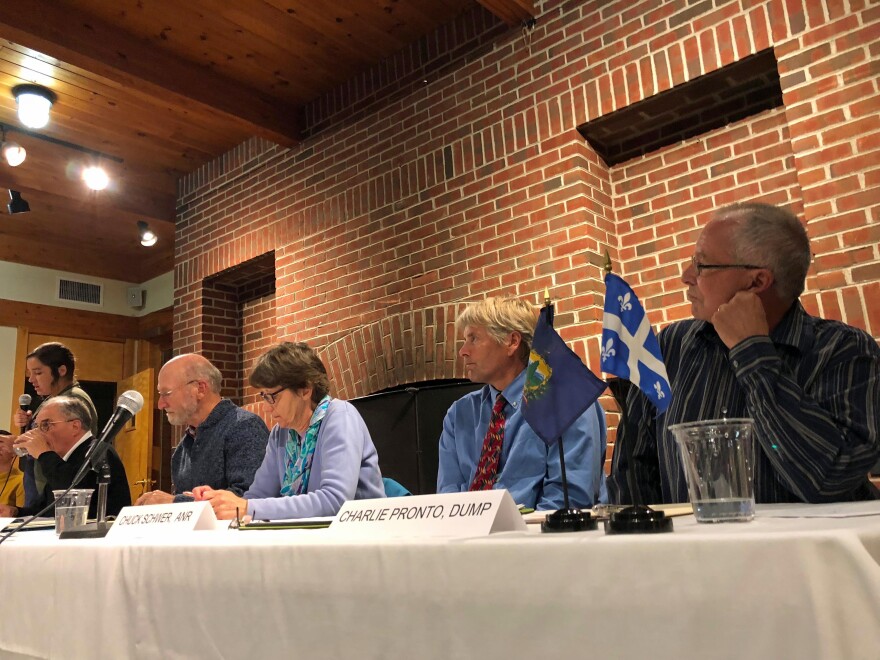Most of the trash generated in Vermont is trucked to the state’s only permitted landfill in the Northeast Kingdom. The landfill's owner has plans to expand it, and this week residents from both sides of the U.S.-Canada border pushed back on those plans.
Nearly 150 people, from both sides of the international border, came to a meeting in Newport on Monday. They were there to discuss a permit application to expand the Coventry landfill, which isn’t far from the Black River and Lake Memphremagog.
The panel discussion included officials from Vermont’s Agency of Natural Resources, the Conservation Law Foundation, and citizen groups from Quebec and the Northeast Kingdom.
Robert Benoit was there representing Quebec’s oldest nonprofit environmental organization, Memphremagog Conservation Inc.
"We are 1,200 member[s]. We want to bring all of them here tonight, but it’s very tough to go through the border," Benoit said, drawing laughter from the audience. "So we just brought about 35 of them."

There is strong Canadian interest in the proposed landfill expansion, because several communities draw their drinking water from Lake Memphremagog.
"The garbage is quite close from the water we drink," said Benoit. "We are 170,000 people in Sherbrooke, Lennoxville, Magog — you know, I can go on and on. There’s quite a number of municipalities there who drink that water. And to tell you the truth, we are worried."
Those concerns have been amplified since testing last month revealed elevated levels of PFAS chemicals, including PFOA, in the groundwater near an unlined, closed portion of the landfill.
Cathy Jamieson, the solid waste program manager for Vermont’s Agency of Natural Resources, said there will be further testing, but that the double-lined landfill currently in operation does not appear to be leaking contaminants.
"So, in essence, the lined … constructed, designed, engineered, lined section of the landfill meets the compliance of our rules," Jamieson said. "The unlined landfill, we need additional data to indicate what would be the next steps."
Conservation Law Foundation is asking the state to delay the permit application process until that testing is complete.

In addition to groundwater concerns, many local residents spoke up about foul odors coming from the landfill, a loss of lake views and heavy truck traffic in their small, quiet towns.
Landfill owner and operator Casella Waste Systems did not send a representative to the meeting to address those concerns. But spokesperson Joe Fusco said he’s not surprised by the local pushback.
"You know, in our business, local opposition is a built-in, expected part of this kind of process," Fusco said. "You know, people sometimes have an emotional reaction to the idea of landfills, and that feeling being less than favorable."
There are about four years remaining on Casella’s current Coventry landfill permit. Fusco said Vermont doesn’t currently have another option, thanks in part to strict environmental standards.
"Landfills need to be highly sophisticated, highly technological facilities that are built with liners, redundant systems, redundant protection systems, all kinds of technology for the collection of leachate, which is runoff liquids from the waste," Fusco explained. "And to do that is extremely capital intensive — in other words, very expensive."
Jamieson, with ANR, said at the meeting that, the fact is, Vermont generates a lot of waste.
"Even though we have excellent programs to try to reduce the waste that we generate, to try to recycle more, to promote composting, and we are further along than many other states ... our small state still generates 500,000 tons of waste that needs to be disposed a year. That’s half-a-million tons of waste that we need to find a home for somewhere," Jamieson said. "And that somewhere needs to be safe."

Yet, many Orleans County residents are still wondering why that somewhere needs to be where they live, so far away from Vermont’s larger towns and cities where most of that waste is generated.
Jen Duggan, director of CLF Vermont, added the state should fully implement its universal recycling law before deciding how much landfill capacity is needed in the coming years.
"The last time the state did a study on what exactly is in the waste that we're disposing of, 67 percent of it could have been composted, recycled," Duggan said. "That's a huge percentage of waste that could have just been diverted completely."
Fusco said if people want to come see the landfill for themselves, there will be an open house and tours Saturday, Sept. 15, from 10 a.m. until 2 p.m.






